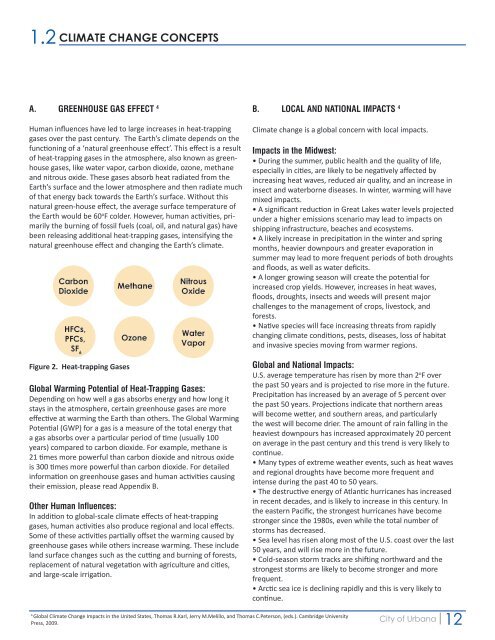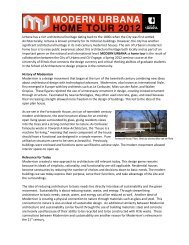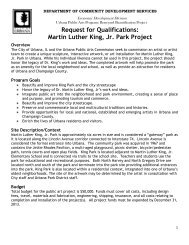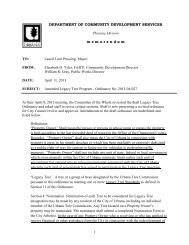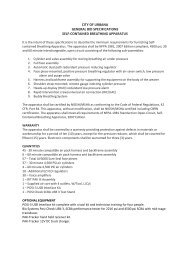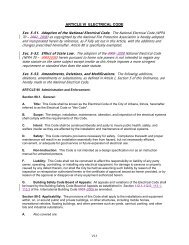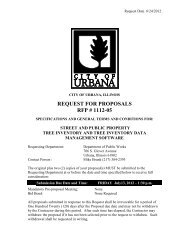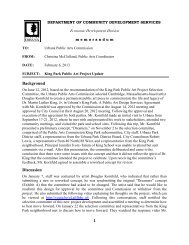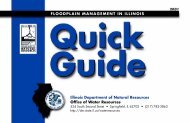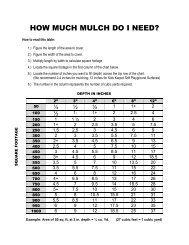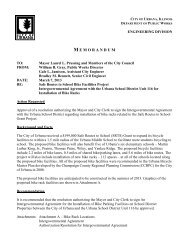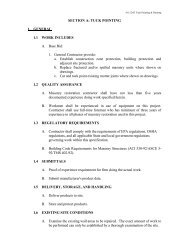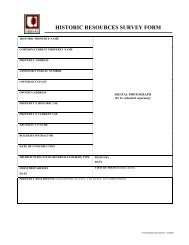CLIMATE ACTION PLAN - City of Urbana
CLIMATE ACTION PLAN - City of Urbana
CLIMATE ACTION PLAN - City of Urbana
- No tags were found...
Create successful ePaper yourself
Turn your PDF publications into a flip-book with our unique Google optimized e-Paper software.
1.2<br />
<strong>CLIMATE</strong> CHANGE CONCEPTS<br />
A. GREENHOUSE GAS EFFECT 4<br />
B. LOCAL AND NATIONAL IMPACTS 4<br />
Human influences have led to large increases in heat-trapping<br />
gases over the past century. The Earth’s climate depends on the<br />
functioning <strong>of</strong> a ‘natural greenhouse effect’. This effect is a result<br />
<strong>of</strong> heat-trapping gases in the atmosphere, also known as greenhouse<br />
gases, like water vapor, carbon dioxide, ozone, methane<br />
and nitrous oxide. These gases absorb heat radiated from the<br />
Earth’s surface and the lower atmosphere and then radiate much<br />
<strong>of</strong> that energy back towards the Earth’s surface. Without this<br />
natural green-house effect, the average surface temperature <strong>of</strong><br />
the Earth would be 60 o F colder. However, human activities, primarily<br />
the burning <strong>of</strong> fossil fuels (coal, oil, and natural gas) have<br />
been releasing additional heat-trapping gases, intensifying the<br />
natural greenhouse effect and changing the Earth’s climate.<br />
Carbon<br />
Dioxide<br />
HFCs,<br />
PFCs,<br />
SF 6<br />
Figure 2. Heat-trapping Gases<br />
Methane<br />
Ozone<br />
Nitrous<br />
Oxide<br />
Water<br />
Vapor<br />
Global Warming Potential <strong>of</strong> Heat-Trapping Gases:<br />
Depending on how well a gas absorbs energy and how long it<br />
stays in the atmosphere, certain greenhouse gases are more<br />
effective at warming the Earth than others. The Global Warming<br />
Potential (GWP) for a gas is a measure <strong>of</strong> the total energy that<br />
a gas absorbs over a particular period <strong>of</strong> time (usually 100<br />
years) compared to carbon dioxide. For example, methane is<br />
21 times more powerful than carbon dioxide and nitrous oxide<br />
is 300 times more powerful than carbon dioxide. For detailed<br />
information on greenhouse gases and human activities causing<br />
their emission, please read Appendix B.<br />
Other Human Influences:<br />
In addition to global-scale climate effects <strong>of</strong> heat-trapping<br />
gases, human activities also produce regional and local effects.<br />
Some <strong>of</strong> these activities partially <strong>of</strong>fset the warming caused by<br />
greenhouse gases while others increase warming. These include<br />
land surface changes such as the cutting and burning <strong>of</strong> forests,<br />
replacement <strong>of</strong> natural vegetation with agriculture and cities,<br />
and large-scale irrigation.<br />
Climate change is a global concern with local impacts.<br />
4<br />
Global Climate Change Impacts in the United States, Thomas R.Karl, Jerry M.Melillo, and Thomas C.Peterson, (eds.). Cambridge University<br />
Press, 2009.<br />
Impacts in the Midwest:<br />
• During the summer, public health and the quality <strong>of</strong> life,<br />
especially in cities, are likely to be negatively affected by<br />
increasing heat waves, reduced air quality, and an increase in<br />
insect and waterborne diseases. In winter, warming will have<br />
mixed impacts.<br />
• A significant reduction in Great Lakes water levels projected<br />
under a higher emissions scenario may lead to impacts on<br />
shipping infrastructure, beaches and ecosystems.<br />
• A likely increase in precipitation in the winter and spring<br />
months, heavier downpours and greater evaporation in<br />
summer may lead to more frequent periods <strong>of</strong> both droughts<br />
and floods, as well as water deficits.<br />
• A longer growing season will create the potential for<br />
increased crop yields. However, increases in heat waves,<br />
floods, droughts, insects and weeds will present major<br />
challenges to the management <strong>of</strong> crops, livestock, and<br />
forests.<br />
• Native species will face increasing threats from rapidly<br />
changing climate conditions, pests, diseases, loss <strong>of</strong> habitat<br />
and invasive species moving from warmer regions.<br />
Global and National Impacts:<br />
U.S. average temperature has risen by more than 2 o F over<br />
the past 50 years and is projected to rise more in the future.<br />
Precipitation has increased by an average <strong>of</strong> 5 percent over<br />
the past 50 years. Projections indicate that northern areas<br />
will become wetter, and southern areas, and particularly<br />
the west will become drier. The amount <strong>of</strong> rain falling in the<br />
heaviest downpours has increased approximately 20 percent<br />
on average in the past century and this trend is very likely to<br />
continue.<br />
• Many types <strong>of</strong> extreme weather events, such as heat waves<br />
and regional droughts have become more frequent and<br />
intense during the past 40 to 50 years.<br />
• The destructive energy <strong>of</strong> Atlantic hurricanes has increased<br />
in recent decades, and is likely to increase in this century. In<br />
the eastern Pacific, the strongest hurricanes have become<br />
stronger since the 1980s, even while the total number <strong>of</strong><br />
storms has decreased.<br />
• Sea level has risen along most <strong>of</strong> the U.S. coast over the last<br />
50 years, and will rise more in the future.<br />
• Cold-season storm tracks are shifting northward and the<br />
strongest storms are likely to become stronger and more<br />
frequent.<br />
• Arctic sea ice is declining rapidly and this is very likely to<br />
continue.<br />
<strong>City</strong> <strong>of</strong> <strong>Urbana</strong><br />
12


